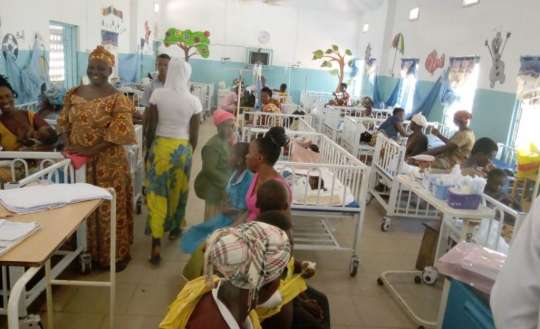A woman is losing so much blood right after having a vaginal delivery; there is a medication to save her, the hospital has it, but she will not receive this life-saving medication if her husband doesn’t raise the money to pay for it.
Francisca Enchill takes you undercover to expose the agony of pregnant women in hospitals, a Pay or Die phenomenon at the Korle Bu Teaching Hospital, Kaneshie Polyclinic, and the Ga West Municipal Hospital, popularly known as the Amasaman Hospital.
This is part II of similar findings at the 37 Military Hospital, Maamobi General Hospital and the Mamprobi Hospital.
Victim’s ordeal at Korle-Bu Teaching Hospital
We run into a woman who looked devastated and asked about how things are done at the Maternity Unit. She narrated how she visited the facility with a cash amount of GHC30 and was charged GHC15 for some tests, GHC5 for covering her antenatal Health Record book, and another GHC5 she did not know what it was meant for. According to her, she realised she didn’t have enough money to take her back home and had to make a call for transportation to be sent to her through Mobile Money to aid her return home.
This is the reality of the financial struggles of the poor referred from the various health facilities to the premier hospital in Ghana. We begin this undercover work at the Korle Bu Teaching Hospital to capture live, this victim’s ordeal as it unfolds.
Korle-Bu Teaching Hospital
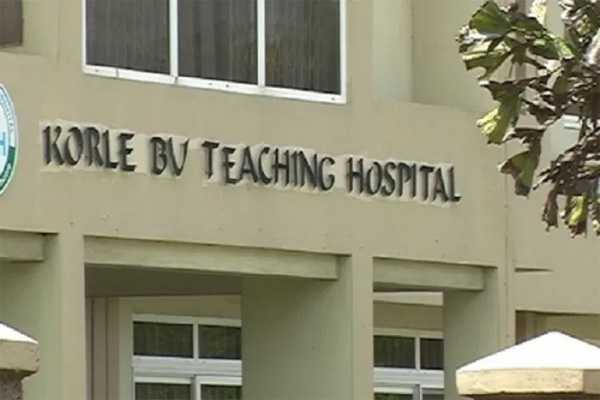
The premier referral hospital averagely records about five maternal mortalities and can record up to 20 infant mortalities in a month.
In spite of this, the hospital and its staff have placed barriers in the way of access to Maternal Healthcare. Pregnant women do not enjoy the Free Maternal Healthcare policy in the premier hospital.
Antenatal
Korle-Bu Teaching Hospital’s Antenatal care is given at two different units of the hospital. The Gynae OPD and the Maternity Unit. The Gynae OPD only accepts pregnancies below 12 weeks and the Maternity Unit accepts pregnancies that are 12-weeks and above.
Gynae OPD: It was found during this investigation that NHIS card bearing pregnant women were required to pay GH¢105.20 for a folder at the Gynae OPD to begin antenatal and pay GH¢17.00 on each antenatal visit till after the 12 weeks where they move to the Maternity Unit.
Maternity unit: At the Maternity unit, pregnant women pay some official and unofficial charges.
Official Charge-Maintenance Fee
The unit officially demands payment of some GH¢5.00. You are not told what exactly you are paying for but every single woman attending antenatal is made to pay this amount on each visit.
You are directed to pay at the bank and submit the receipt as proof to the nurse before you can enter the consultation room for your antenatal care. This payment is classified as Antenatal Maintenance Fee on the receipt.
The demand of the payment is emphasised at every point of the antenatal processing.
Unofficial charges
Also captured was the demand for some payments by health workers directly to themselves without issuing receipts. These payments included GH¢5.00 as the cost of covering the Maternal Health Record Book with a rubber as well as the demand for the payment of GH¢15.00 at the Counseling room after HIV-AIDS, HB, and Sugar tests.
Management’s Response
The Chief Nursing Officer of the Department of Obstetrics and Gynecology at the Korle-Bu Teaching Hospital, Mary Andoh Eshun, acknowledged officially charging the antenatal maintenance fee but said it was a management decision.
She, however, denied knowledge of the GH¢5.00 unofficial charge by the nurses and the GH¢15.00 taken in the counseling room. According to her, all tests conducted at the counseling room are fully covered by NHIS. Meanwhile, staff members were found taking money from patients during this investigation.
She also stated that no staff of the unit is allowed to take any payment from any patient. Hence, staff found taking money during this investigation will face punitive action.
Ultrasound scan: At the Korle-Bu Teaching Hospital, a scan costs GH¢70.00.
Response of Korle-Bu Teaching Hospital
In an interview with the Chief Nursing Officer of the hospital, Mary Andoh Eshun, she admitted that the hospital charges for a scan. According to her, management made the decision to charge for scans and this was approved by the Ministry of Health and Parliament.
Laboratory tests: At the Central lab of the Korle-Bu Teaching Hospital, pregnant women covered by the NHIS spend up to GHc142.00 on the first group of laboratory tests.
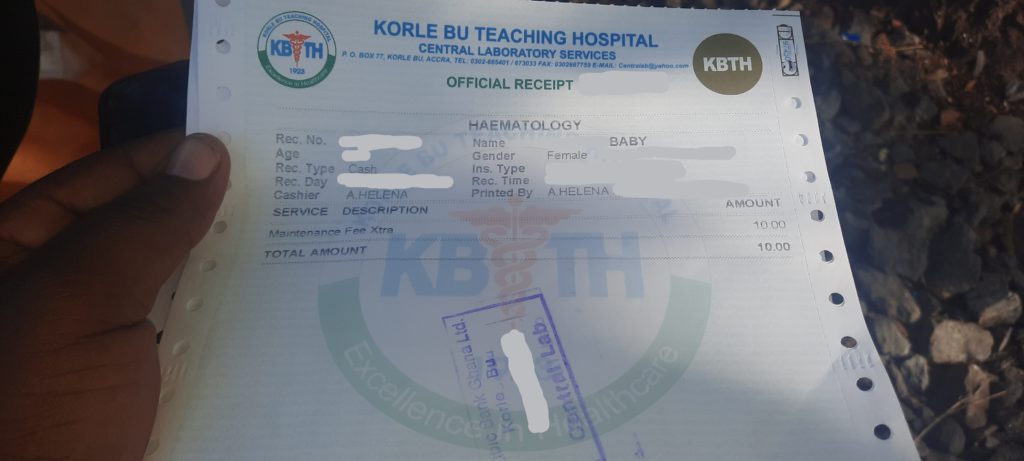
The following tests are supposed to be free but they are not free at this hospital. G6PD costs GHc49.00, Hep. Bs Antigen (HBsAg) costs GHc31.00 and the Urine routine exams cost GHc27.00.
At the Korle-Bu Teaching Hospital, Blood Group test is conducted at the Blood Bank, during a visit to that unit, the pregnant woman was charged Ghc35.00. The attendant at the Blood Bank stated categorically that NHIS does not work at the Blood Bank.
NHIS’s response
Mrs Vivian Addo-Cobbiah, Deputy Chief Executive, Operations at National Health Insurance Authority (NHIA), stated that pregnant women should not pay for any of such charges as the hospitals make claims and get paid for rendering those services. According to her, these could be barriers that prevent the poor from accessing antenatal care, defeating the purpose for which the policy was introduced.
Delivery
At the Korle-Bu Teaching Hospital, delivery is not free. It is paid for and it is expensive. The magnitude of unlawful charges for delivery varied depending on how normal or complicated the delivery was which informs what goes into the delivery.
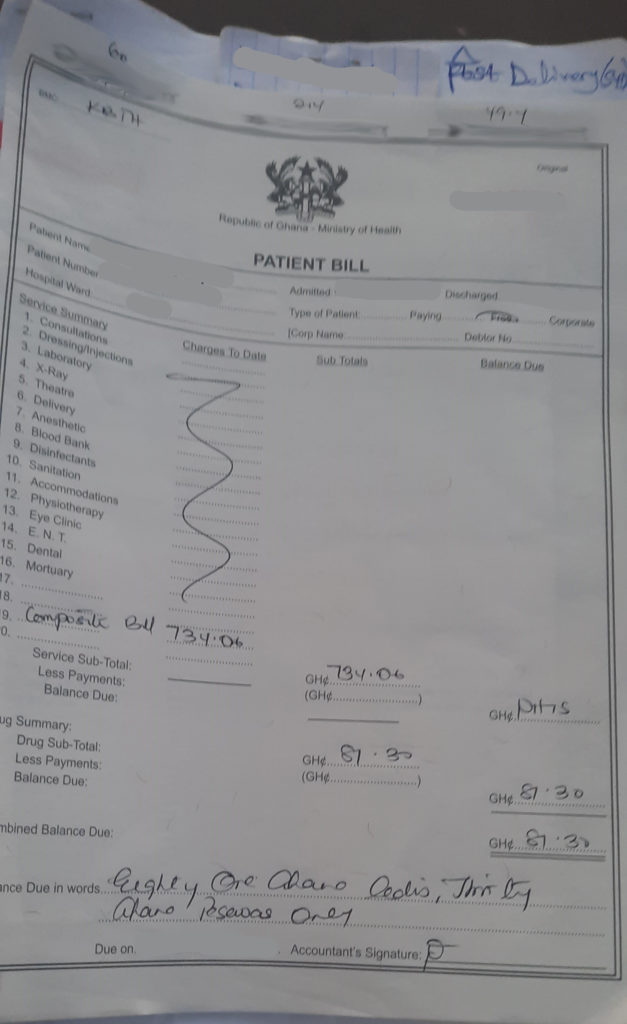
At the Korle-Bu Teaching Hospital, pregnant women with NHIS cover are charged GHc400.00 and above for spontaneous Vaginal Delivery while delivery by CS costs Ghc1,500.00 and above for NHIS holders.
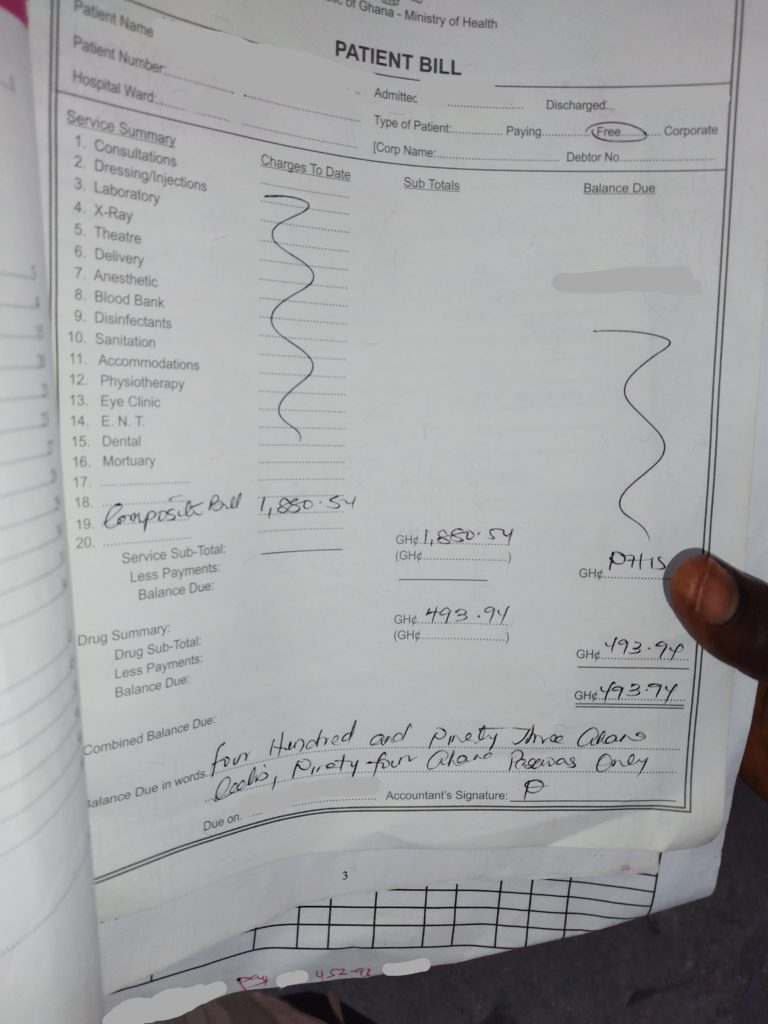
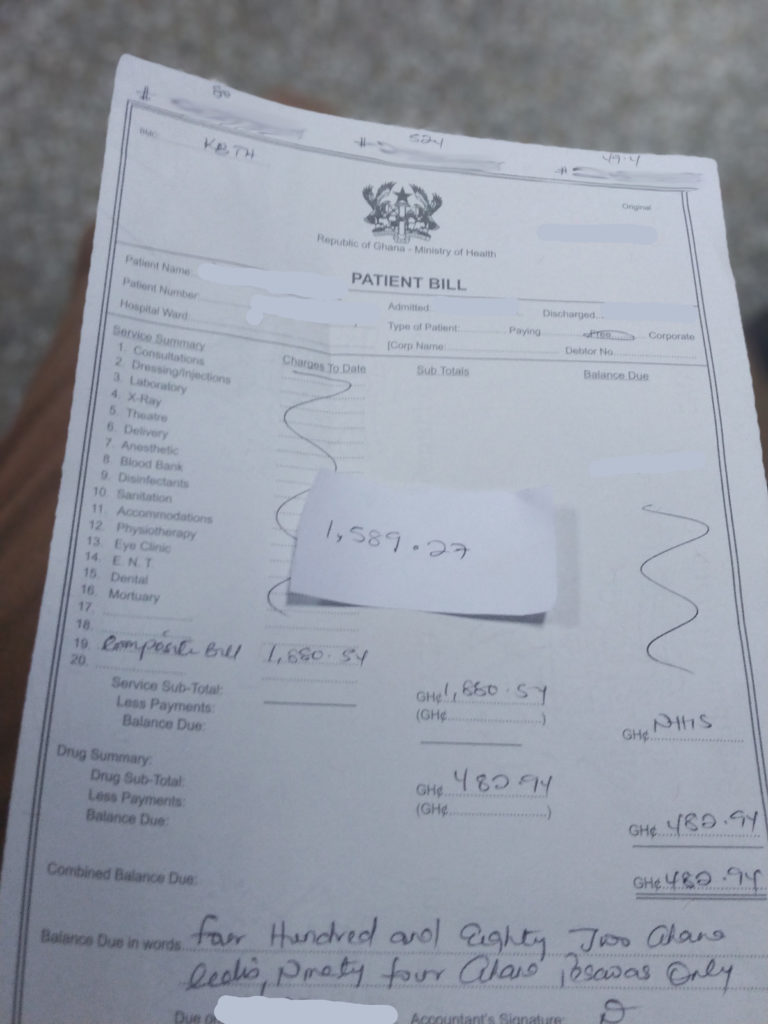
The Premier hospitals appeared to have some similar practices like a strange phenomenon of NHIS not covering any drug in the pharmacy of the Maternity Unit. The difference though is at Korle-Bu Teaching Hospital, important drugs are administered on the pregnant woman when it is needed, and she is then billed to pay for the drugs during discharge. The hospital, however, gives prescriptions to escorts of pregnant women to make some other purchases elsewhere.
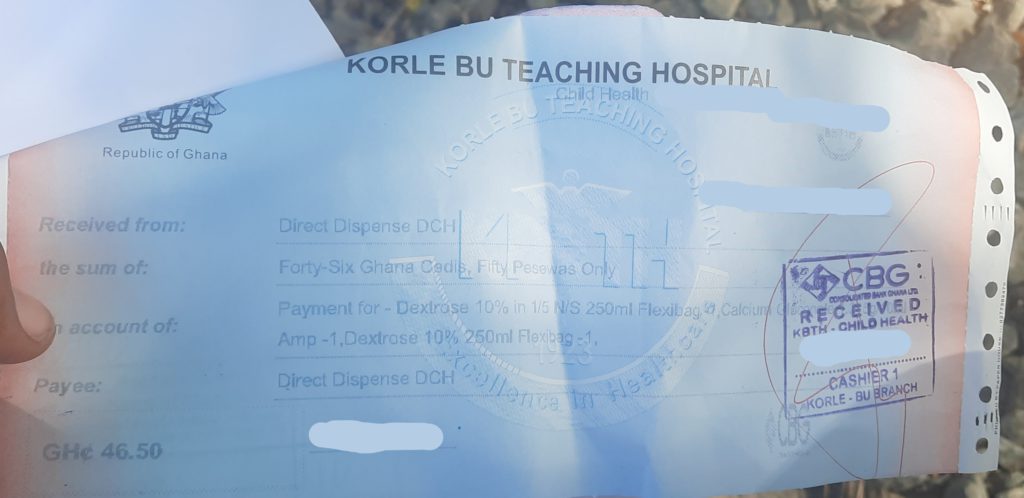
Aside the drugs, lab tests and scans are paid for on a cash-and-carry basis.
NICU: This investigation established that the Korle-Bu Teaching Hospital renders Neonatal Intensive Care Unit (NICU) services, NHIS holders are charged for the care. Pregnant women are to budget Ghc1,000 in anticipation of a NICU.
Every NHIS covered woman whose newborn is admitted at the NICU of Korle-Bu is charged a fixed amount of Ghc410 and Ghc20 for wipes.
Despite having paid the fixed charge, lab tests, drugs are paid for on a cash-and-carry basis by the parents.
Management response
In an interview with Chief Nursing Officer of the Department of Obstetrics and Gynecology at the Korle-Bu Teaching Hospital, Mary Andoh Eshun, she admitted that the hospital officially unlawfully charges for all the services found to be paid for during this investigation.
According to her, all those charges are management approved and those approvals have the backing of the Ministry of Health (MoH). Meanwhile, the MoH is the supervisor and regulator of the FMHC policy.
Ga West Municipal Hospital
We continued this investigation at the Ga West Municipal Hospital, popularly called the Amasaman General Hospital. Staff of this hospital exploit the vulnerability of pregnant women and their desperate families. They see delivery as profit making opportunity, cashing in on the poor and vulnerable with strange and insensitive charges like ‘Other income.’
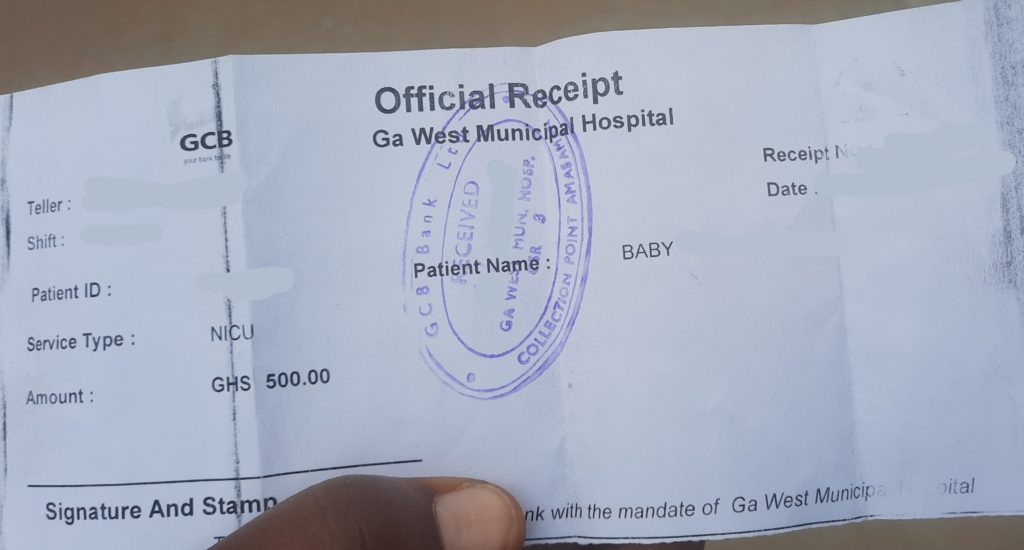
Ultrasound Scan: At the Ga West Municipal Hospital, NHIS covered pregnant women are refused their free scan entitlement under the Free Maternal Healthcare Policy. A scan costs GH¢30.00.
Management’s response
In an interview with Dr Eric Sarpong-Ntiamoah, the Head of the Ga West Municipal Hospital, he said that scans medically requested are covered, hence pregnant women enjoy them for free but scan personally requested by pregnant women on the grounds of knowing sex of the unborn baby is paid for. This, he said, costs Ghc25.00.
His response was found to be inaccurate as this investigation established that scans medically requested for are equally paid for and the cost of scan in his facility is not Ghc25 as he claimed but rather GH¢30.00.
In fact, the staff who operates the scan room stated categorically that NHIS is not accepted in her unit. “I don’t accept NHIS here, you will pay! Ghc30.”
Laboratory test: At this hospital, pregnant women are denied free laboratory tests. The group of lab tests requested at the beginning of antenatal which are supposed to be free under the NHIS costs Ghc60.00 at this facility. All other subsequent labs are equally not free.
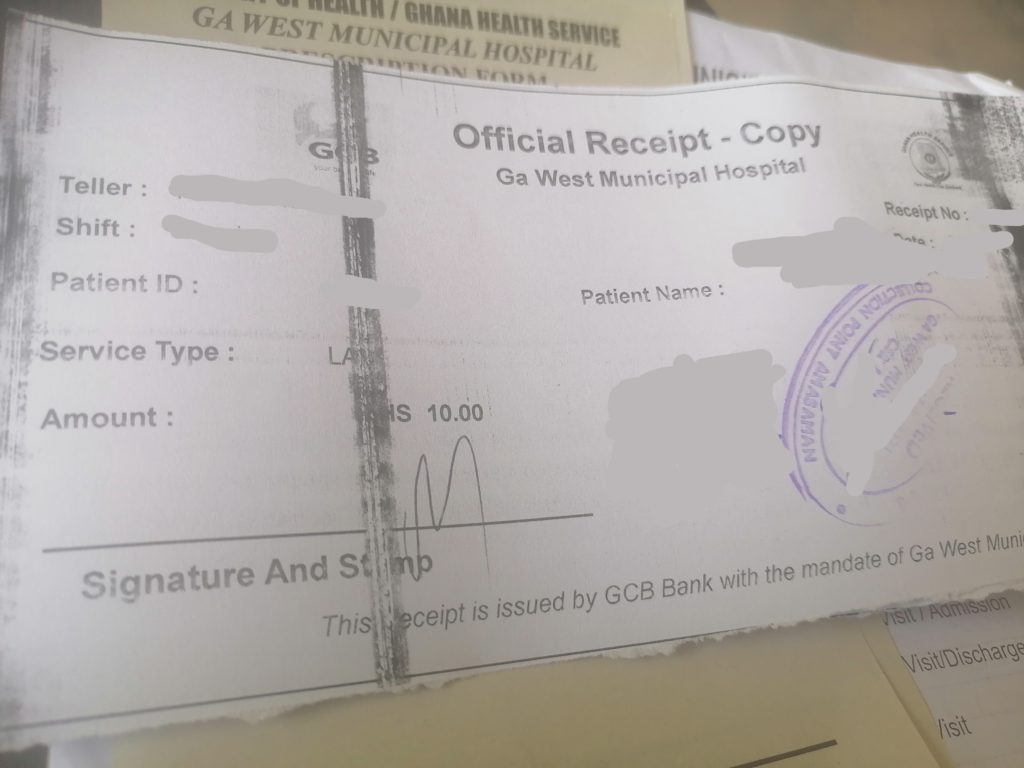
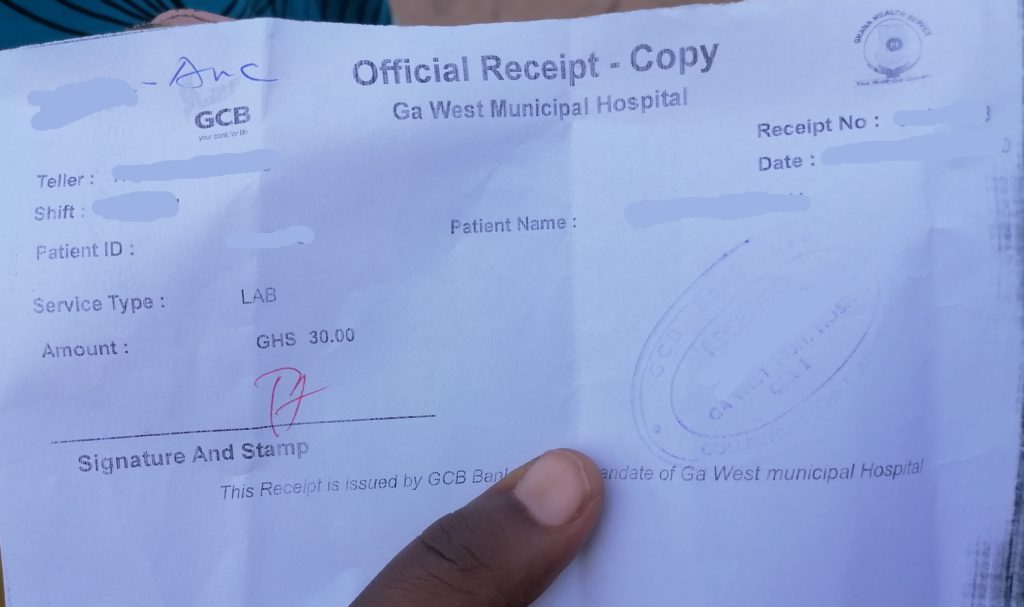
Management’s response
Dr Sarpong-Ntiamoah, said NHIS does not cover all required laboratory tests, hence, those covered are given for free while the others cost Ghc30.00.
According to him, “full blood count, is not covered, it is not part of the bundle, a test like Hepatitis B, which is also a very key requirement, it is an infectious disease, a mother may pass it on to the child is not on the bundle. G6PD, is not on the bundle. So we give the bundled ones for free and the ones that are not on the bundle, you pay a small token of Ghc30, for it.”
NHIS’ response to Laboratory tests
According to Mrs Addo-Cobbiah, all laboratory tests required in the cause of pregnancy are all fully covered by NHIS, hence, pregnant women should not pay any amount of money officially or unofficially.
“Every single lab test required, from the CHIPS compound, through to primary hospitals, through to secondary hospitals to even tertiary hospitals are fully covered.
“We have the benefit package for diagnostic services and they are all indicated with how much each of these diagnostic investigations cost clearly. So pregnant women are not supposed to pay anything.”
According to her, apart from services stated in the exclusion list that are not covered by NHIS, every other thing is covered. “Every required investigation for a pregnant woman is fully covered.”
Management of some hospitals claimed they were unaware of the benefits under the Free Maternal Healthcare policy. Mrs Addo-Cobbiah disagrees with that claim. According to her, any claim by the head of any Health Centre that they are not aware of the benefits is totally false as NHIA holds annual stakeholder meetings twice every year with heads of health centres.
Ghana Health Service also invites NHIA to their review meetings and at each of these meetings, the education on NHIS policy and its benefits are continuously given to the health workers.
Antenatal drugs: This hospital also makes available the antenatal drugs at the antenatal unit. These drugs are given for free. However, pregnant women are made to pay for some other drugs.
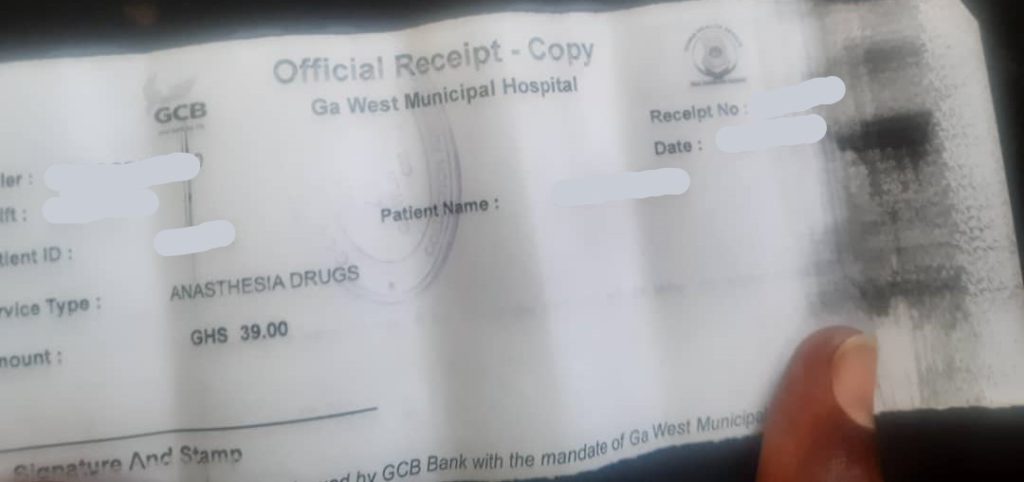
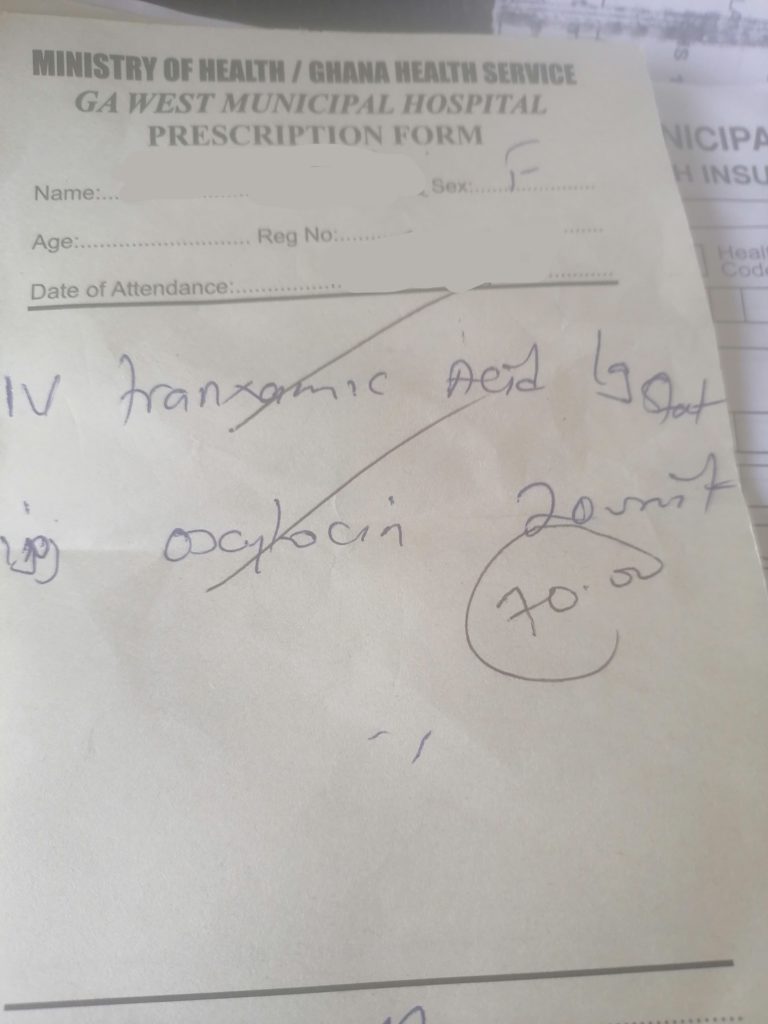
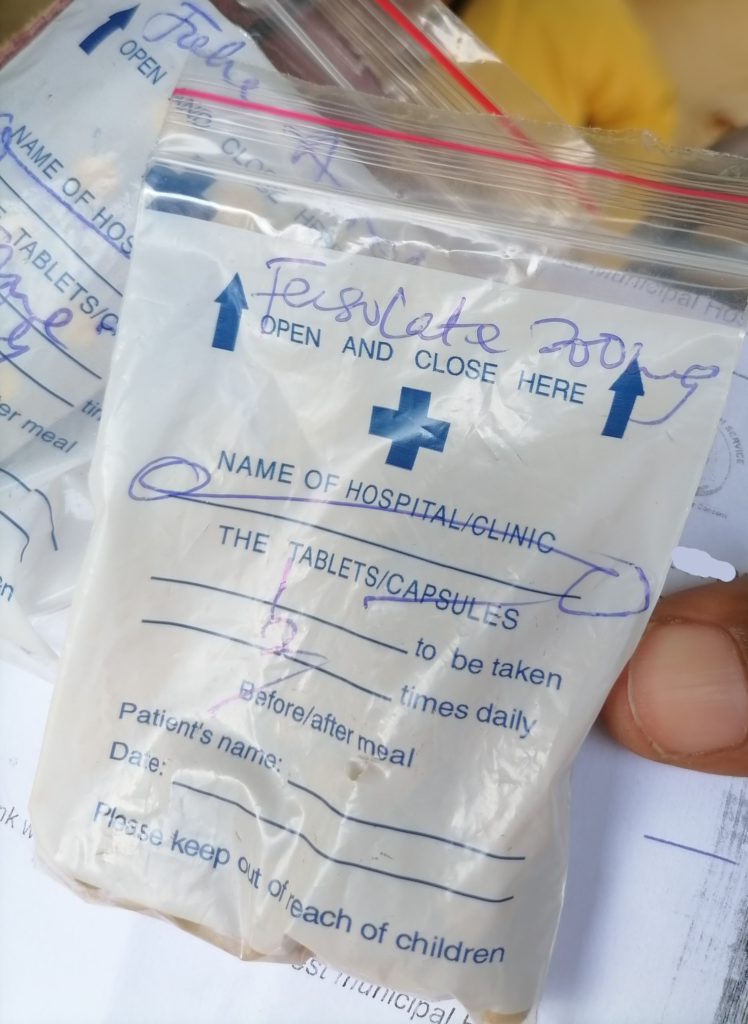
Delivery: At the Ga West Municipal Hospital, despite the facility officially claiming that both spontaneous vaginal delivery and Caesarean section are free, this investigation established that delivery is not free in this hospital. The hospital charges both official and unofficial illegal bills.
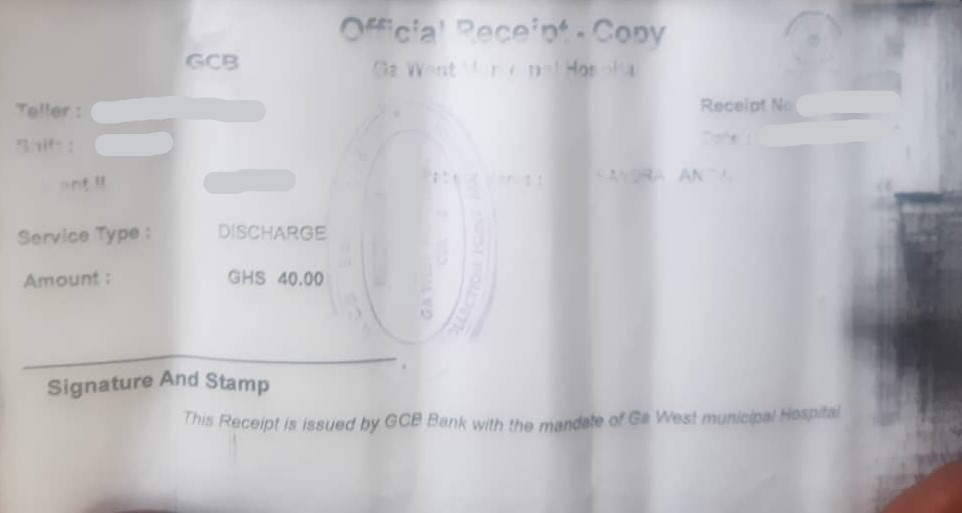
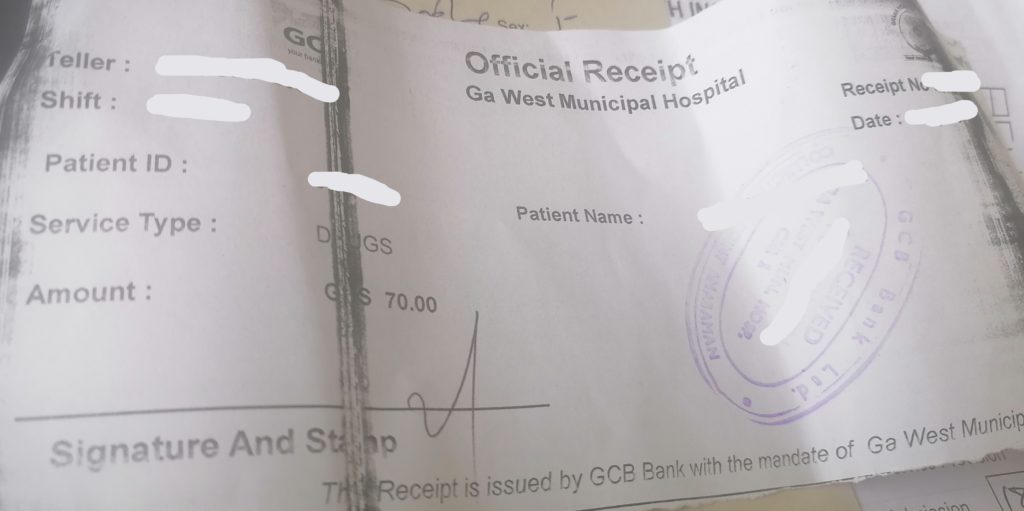
Pregnant women are required to budget for more than Ghc500.00 to take care of the cost of delivery drugs, lab tests, charges like Assessment, Other income, Discharge, ward fund among others. The most critical health needs are paid on a cash and carry basis.
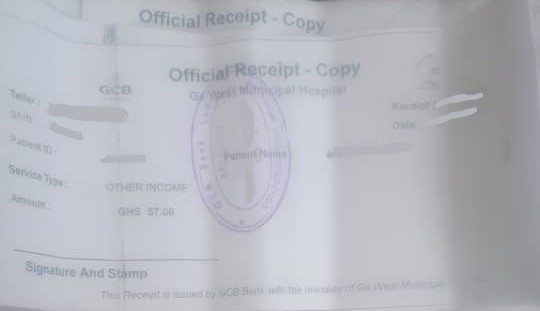
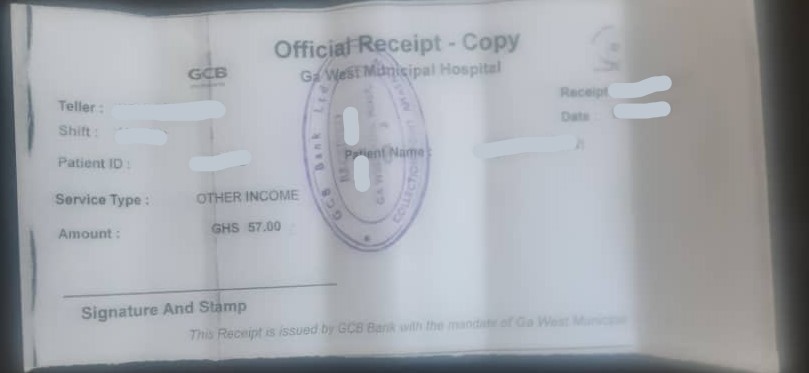
Escorts of pregnant women could spend as much as 45 minutes in queue to pay for the drugs to save a woman hemorrhaging after delivery.
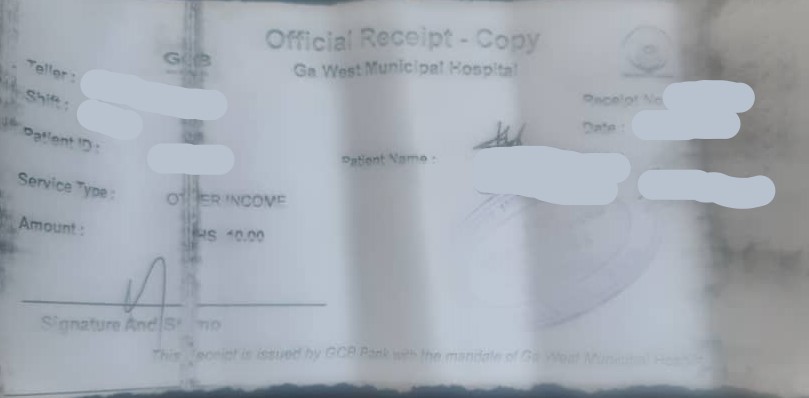
Midwives in the Labor Ward charge women and their escorts unlawful charges as Ward Fund and cost of Episiotomy before discharging the women and their newborns.
This charge ranges between GHc90.00 and Ghc150.00. Receipts are not issued for these charges and any patient that insists on being given a receipt is intimidated by the midwives.
Kaneshie Polyclinic
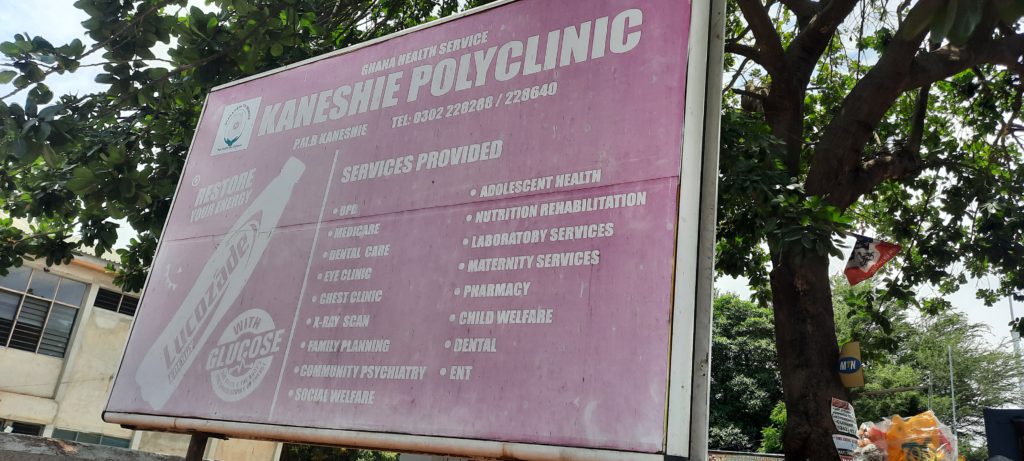
We concluded the investigation of the six health facilities at the Kaneshie Polyclinic. Management of this facility claimed they were not aware of some of the benefits of pregnant women under the Free Maternal Healthcare policy.
Ultrasound scan: At the Kaneshie Polyclinic, pregnant women were officially charged GH¢35.00 for each scan. This amount is paid each time a scan is medically required.
Response of Management on scan
In an interview with management of the Kaneshie Polyclinic, management admitted charging pregnant women for ultrasound scans.
The Medical Director of the facility, Dr Stella Gyamfi, disclosed that she was not aware that scan was part of the entitlements of pregnant women under the Free Maternal Care policy.
NHIS response
According to Mrs Vivian Addo-Cobbiah, Deputy Chief Executive, Operations at NHIA, the hospitals are very well informed about what is covered under the FMHC policy, hence cannot be pardoned for claiming they are not aware.
“You will be given the Operations manual, medicines list, the tariffs so I don’t see any reason or justification for somebody to say that ‘I’m not aware’,” she added.
Laboratory: At the laboratory of the Kaneshie Polyclinic, the staff of the laboratory frequently announced that some of the compulsory tests pregnant women are required to undertake are not covered by NHIS, hence, all pregnant women are required to pay GHc40.00 for the tests not covered.

At the lab of this facility, samples are taken and the Ghc40.00 bill is issued. Pregnant women are then directed to pay at the bank after which the pregnant women are required to present copies of the receipt at the lab as proof of payment before results are released to them.
Management response on lab
Dr Stella Gyamfi disclosed that all lab tests are conducted for free for pregnant women as required by the policy.
“NHIS has approached us several times to clarify with us about lab, so the labs are done free since I came here and the lab In-charge was transferred here a few months after I came here. They are completely free; you don’t pay a dime,” she said.
However, the Head, Laboratory Technician, Ebenezer Nku, responded to the contrary. His response confirmed the findings of this investigation which is the payment of Ghc40.00.
These tests the facility charges the Ghc40.00 for are Hepatitis B, for which GHc10.00 is charged and full blood count, for which GHc30.00 is charged.
However, these two tests are covered according to the GHS. NHIS also emphasised that those two tests are covered.
Antenatal Drugs: The pharmacy of Kaneshie Polyclinic makes claims of non-availability of drugs covered under the Free Maternal Healthcare policy. Drugs that pregnant women are made to pay for are, however, always available. They refuse pregnant women drugs like folic acid, a drug used to treat or prevent folate deficiency anemia, help unborn baby’s brain, skull and spinal cord develop properly to avoid development problems, birth defects and miscarriage.
Management’s response on drugs
Although the pharmacist claimed folic acid was not available, the Medical Superintendent, Dr Gyamfi disclosed during an interview that the facility had enough folic acid in stock from September 2019 till date, an indication that, at the time of our investigation, the facility had folic acid but the pharmacy failed to give them out to pregnant women.
NHIS response on Scans
In an interview with Mrs Vivian Addo-Cobbiah, Deputy Chief Executive, Operations at NHIA, she said that every pregnant woman is entitled to two free Ultrasound scans, one of which can be done in the first trimester of pregnancy and the other, in the 3rd trimester.
According to her, the NHIS Operation Manual states clearly that aside the two fixed scans pregnant women are entitled to as many free scans as medically required.
“Two ultrasound scans are covered by NHIS. You can go for your scan during the first trimester and you can do the same during the third trimester. But in-between, if there is any indication, that one too is covered. If it is medically requested, it is covered by NHIS.”
NHIA response to all charges
Mrs Vivian Addo-Cobbiah, Deputy Chief Executive, Operations at NHIA said stakeholder meetings are held on schedule and at these meetings, they discuss claim payments and challenges they face and the NHIA provides guidance to address the challenges.
“When you apply to be credentialed to provide services to our people, we give you the Operations Manual, we take you through what is covered and what is not covered, you are given the tariff structure, so you know, the services you are to provide, you know those that are covered, it is clearly stated, and you accept and sign at the regional office that you are going to work within the policy framework,” Mrs Addo-Cobbiah stressed.
According to her, because about 90% of most of the Internally Generated Funds of most of the facilities working with NHIS is made from NHIS, health facilities take interest in the policy so they know what the benefits entail.
Latest Stories
-
Justice Ackaah-Boafo stumbles through nat’l pledge in light-hearted moment during vetting
1 minute -
Train judges on AfCFTA to safeguard Africa’s free trade vision – Justice Ackaah-Boafo urges
27 minutes -
Cedi’s appreciation triggers price cuts, discounts at ‘Ecobank JoyNews Habitat Fair’ mini clinic
43 minutes -
Stop blaming us for galamsey; you hired them – Chinese Ambassador fires back at Ghanaians
47 minutes -
The Stirring You Can’t Ignore: 3 Signs God Is Calling You Into MORE
56 minutes -
Police launch raid on illegal miners in Asenanyo Forest Reserve
1 hour -
Justice Ackaah-Boafo condemns ‘mob justice’, urges faith in Ghana’s legal system
1 hour -
Keep Supreme Court retirement age at 70 – Justice Ackaah-Boafo urges
1 hour -
Mr. Mike Eghan
1 hour -
Mr Kofi Amponsah-Efah
1 hour -
Judges must be AI literate – Justice Ackaah-Boafo
1 hour -
People must be responsible on social media, the law can catch up with them -Justice Ackaah-Boafo
1 hour -
Mrs. Victoria Ama Serwah Arthur
2 hours -
Equater Energy to launch BuyPower Gh app on July 1
2 hours -
KMA restricts street trading, enhances traffic regulations as Kumasi welcomes Eswatini King
2 hours

